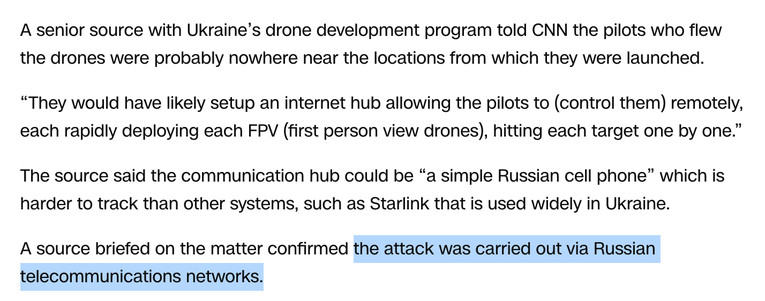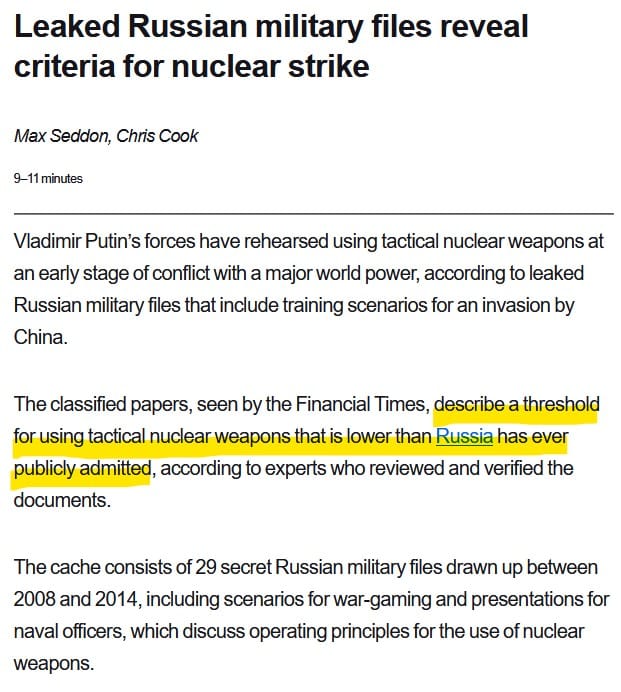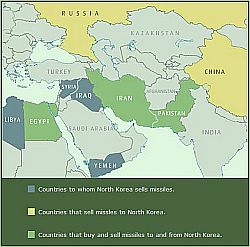The Art of War, Ukraine Edition
[NB: check the byline, thanks. /~Rayne]
Marcy shared this observation yesterday via Bluesky about Ukraine’s attack on Russian air bases:
emptywheel @[email protected]
The Ukrainian attack used RU telecom networks rather than Starlink.
Hard to guess whether this will drive Putin or Elon nuts first.
https://edition.cnn.com/2025/06/02/europe/inside-ukraine-drone-attack-russian-air-bases-latam-intl
The brazenness of using Russia’s telecom networks is noteworthy, especially after concerns that Ukraine’s military operations could be compromised by Russian access to Elon Musk’s Starlink satellite communications.
The avoidance of Starlink for this mission named Operation Spiderweb (Ukrainian: Operatsija Pavutyna) suggests Ukraine accepted this possibility as reality and deliberately worked around the compromised network.
The success of the mission may also suggest this was a solid assumption and avoiding Starlink an effective decision.
There are two points in reporting about Operation Spiderweb which haven’t been analyzed further:
— The specificity of the plan’s inception;
— The role of Ukraine’s security service, the Sluzhba bezpeky Ukrainy (SBU).
CNN and other outlets reported the number of drones Ukraine used to attack Russian military aircraft (117) and the amount of time the operation took from inception to the attack (one year, six months and nine days). The candor is rather shocking; perhaps cognitive dissonance explains why there haven’t been many analysts picking apart these openly shared details.
But these details may have messages within them considering how in-your-face they are. The number 117 seems peculiar because it’s an odd number though it’s not prime. Were all the drones that were smuggled in deployed? Was this another reason why the Trojan Horse wooden sheds were booby trapped — to eliminate any drones that did not deploy properly? Or perhaps the number simply is what it is on the face of it.
The exactness of the operation’s inception, though, seems deliberate, as if launch date meant something. Depending on how the one year, six months, and nine days are counted, the spiderweb began on November 22, 2023 or on December 23, 2023.
November 22 marked the beginning of the Orange Revolution in 2004.
December 23 marked the holiday observed by Ukraine’s Armed Forces — Operational Servicemen Day.
Just as importantly, June 1 on which the attack occurred was the anniversary of the day Ukraine transferred the last of its nuclear warheads to Russia in 1996 under the terms of the Budapest Memorandum to which the US was a party. In other words, this message might not have been intended just for Russia.
The Budapest Memorandum may also explain the role of SBU to effect this operation. While one source in CNN’s reporting attributed the successful mission to “Ukraine’s special services,” most reports credited the operation to the SBU.
SBU is Ukraine’s counterintelligence organization with paramilitary features. It does not have the same reporting structure as Ukraine’s Armed Forces. It’s also responsible for the security of Ukraine’s president and reports directly to him. The flat structure may have ensured the level of secrecy necessary to carry out Operation Spiderweb.
The not-quite-military role of the SBU may also have been critical to lawfare. An operation conducted by SBU may be construed as a counterintelligence operation and not a military operation, fuzzing the ability of the target to respond under terms of its own doctrine or terms of treaties. If a trigger for Russia to launch an escalated military response is the use of conventional kinetic weapons on its soil by another country’s armed forces, Operation Spiderweb skirts this threshold having used non-traditional weapons deployed by a counterintelligence function.
By its subtle emphasis on the Budapest Memorandum, Ukraine made a point of Russia’s failure to comply with the memorandum’s terms after repeated threats of nuclear attacks against Ukraine and the west. Targeting long-range aircraft capable of carrying nuclear weapons, Ukraine punctuated the Memorandum’s terms including nuclear non-proliferation.
Ukraine’s president Volodymyr Zelenskyy has had a number of top military personnel swapped out during the course of the Russo-Ukraine war (ex. the commander of the Joint Forces of the Armed Forces in June 2024, the commander-in-chief of the Armed Forces in February 2024, all regional military recruitment chiefs in August 2023), which might have suggested to outsiders cohesiveness could have been compromised by poor performance, disagreements with the conduct of the war, and plain old corruption. The personnel changes may have given the appearance Ukraine was not fully aligned toward repelling Russian aggression.
But as Sun Tzu wrote in The Art of War, all warfare is based on deception.
The illusion these personnel changes created may have been relied upon as a head fake, allowing Vladimir Putin and the Russian military to feel excessively confident about the outcome of the war. That confidence was surely ruptured just as Russia and Ukraine entered a new round of negotiations to end the war this Monday in Istanbul. Russia opened by presenting a “memorandum” of terms but Ukraine has expressed its lack of faith in Russia’s compliance with co-signed memoranda.
Detonating explosives targeting the Kerch Strait bridge — a bridge one one likely use if driving from Turkey to Ukraine — added emphasis.
There is one more important facet to the timing of the operation’s inception. In February 2024, the Financial Times reported on leaked Russian military files:
When exactly were these documents leaked? To whom had they been leaked and how long was it before the Financial Times reported on them?
Is it possible the inception of Operation Spiderweb coincided with the leak of these documents which occurred after repeated attempts by Russia to blackmail Ukraine and the west using the threat of nuclear war?
Which brings up a third point not discussed in media coverage of Operation Spiderweb: by eliminating a sizeable portion of Russia’s capacity to deliver nuclear weapons, Ukraine has blunted Russia’s threat against the west and China.
This was worth all the military aid provided to Ukraine to date, and then some. Ukraine has more than earned a place in the European Community and NATO.




![[Photo: Emily Morter via Unsplash]](https://www.emptywheel.net/wp-content/uploads/2017/08/Question_EmilyMorter-Unsplash.jpg)
![[image by Images Money via Flickr]](https://www.emptywheel.net/wp-content/uploads/2016/01/ChineseFortuneCookie_ImagesMoney-Flickr.jpg)
